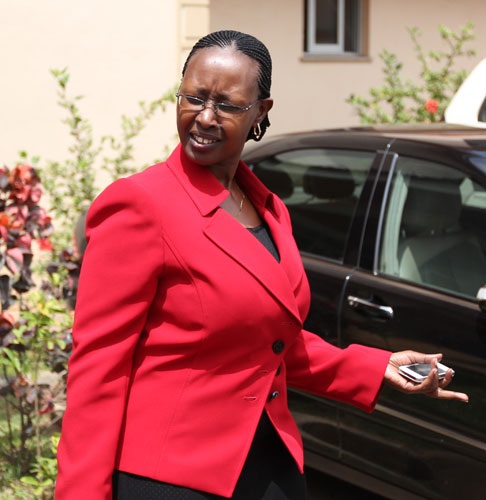
Kampala, Uganda | THE INDEPENDENT | Parliament’s decision to approve the appointment of Alice Kaboyo as Minister of State for Luwero Triangle-Rwenzori region has attracted criticism from a section of lawyers and officials from Anti-corruption agencies.
The Appointments Committee chaired by Deputy Speaker Anita Among had earlier rejected Kaboyo’s appointment on the basis of her conviction by the Anti-Corruption Court in 2012. She had pleaded guilty to charges of abuse of office for her involvement in a corruption scandal on funding from the Global Alliance for Vaccines and Immunization (GAVI).
Kaboyo who was jointly charged together with three former health ministers, Jim Muhwezi, his deputies, Mike Mukula and Dr Alex Kamugisa was sentenced to a fine of 20 million Shillings or a jail sentence for eight years. She chose to pay the fine but according to the Anti-Corruption Act, she is disqualified from holding public office for a period of 10 years from the time of her conviction.
Despite the issues at hand, 22 legislators from the National Resistance Movement (NRM) party voted in favour of Kaboyo’s approval on Tuesday. Four Opposition MPs rejected while one abstained. Sources from the committee indicated that they received an appeal request from President Yoweri Museveni to reconsider their earlier position assuring MPs that Kaboyo was remorseful and paid fines imposed by the court.
Now, lawyer Andrew Mumpenjje argues that the approval is void given the provision under the Anti-Corruption Act. “It is not yet 10 years, yet the law is very clear that you must take a minimum of 10 years if you are convicted of that offence of abuse of office. Kaboyo has never appealed that decision…in fact, she admitted and confessed to the offence. That record has never changed,” said Mumpenjje.
He says that Kaboyo’s appointment with such a record is an attack on the Anti-Corruption Act which prohibits her from being appointed in any public office.
“When you look at our Constitution, it is true that the President has executive authority under Article 99 but the Article is clear that the authority must be exercised in line with the Constitution and the laws of Uganda. The laws of Uganda include the Anti-Corruption Act and it is the Act that has made it clear that a person like Kaboyo who was convicted of abuse of office, cannot be a Minister,” he explains.
Mumpenjje says that the President cannot hide under the executive authority to appoint any person without following the laws of Uganda.
But lawyer Jamiru Mujurizi says that there is nothing legal to prohibit Kaboyo from qualifying as a Minister since the court decision did not specifically set a condition that she should not serve. “… legally speaking, once somebody has been punished by the court and she serves the punishment, the presumption is that this person has become remorseful and has changed,” Mujurizi argues.
However, Mujurizi says that the case in point only poses a political question in regard to the appointment of someone who has been convicted for corruption yet the government seeks to fight corruption.
Cissy Kagaba, the Executive Director of the Anti-Corruption Coalition Uganda (ACCU) says that the approval of Kaboyo’s appointment is a mockery of the country’s fight against corruption. She adds that Parliament’s turnaround on its earlier decision shows that the country has a weak Appointments Committee that fails to stand by its decisions.
“It’s a blatant abuse of the law and an embarrassment especially on the Appointments Committee which initially had demonstrated that they were not going to confirm the person. This means that in that particular time, they were merely posturing to the public to show that they were committed to upholding the issue of anti-corruption,” Kagaba said.
Kagaba also wondered what the committee based on to overturn their earlier decision which she says was grounded in law.
Peter Wandera, the Executive Director of Transparency International Uganda also agrees with Kagaba that parliament should have been strong enough to stand its ground because they had all the right to say no. He adds that the approval makes them uncomfortable at a time when they expect punitive measures to be taken against the corrupt.
“Appointing somebody who is tainted with corruption back into public office sends a wrong signal to the rest of the appointed people. It shows that once you are loyal or once you support the regime, you can easily get away with issues around corruption. I think once somebody is implicated with abuse of office or any corruption-related matter, that person shouldn’t be appointed to any post especially in government,” said Wandera.
While swearing in a section of ministers at Kololo Independence grounds last month, President Museveni tasked the new cabinet with five targets to focus on in the next five years. These include fighting corruption, service delivery, cohesion, integration and patriotism.
****
URN
 The Independent Uganda: You get the Truth we Pay the Price
The Independent Uganda: You get the Truth we Pay the Price






